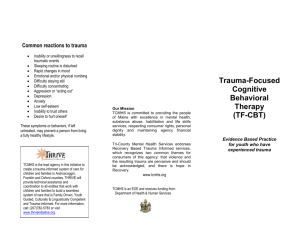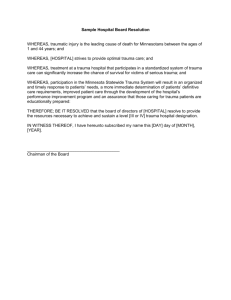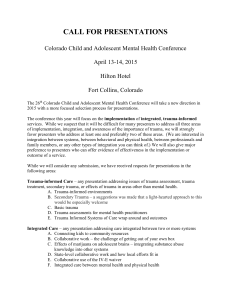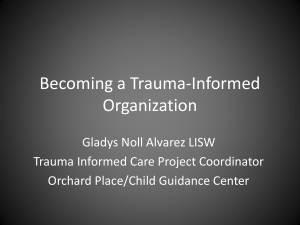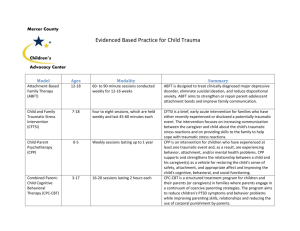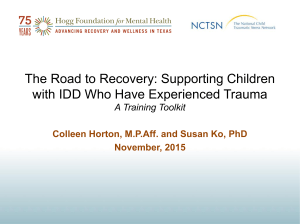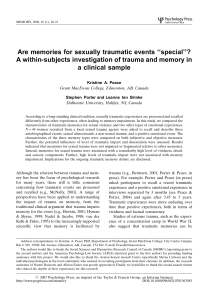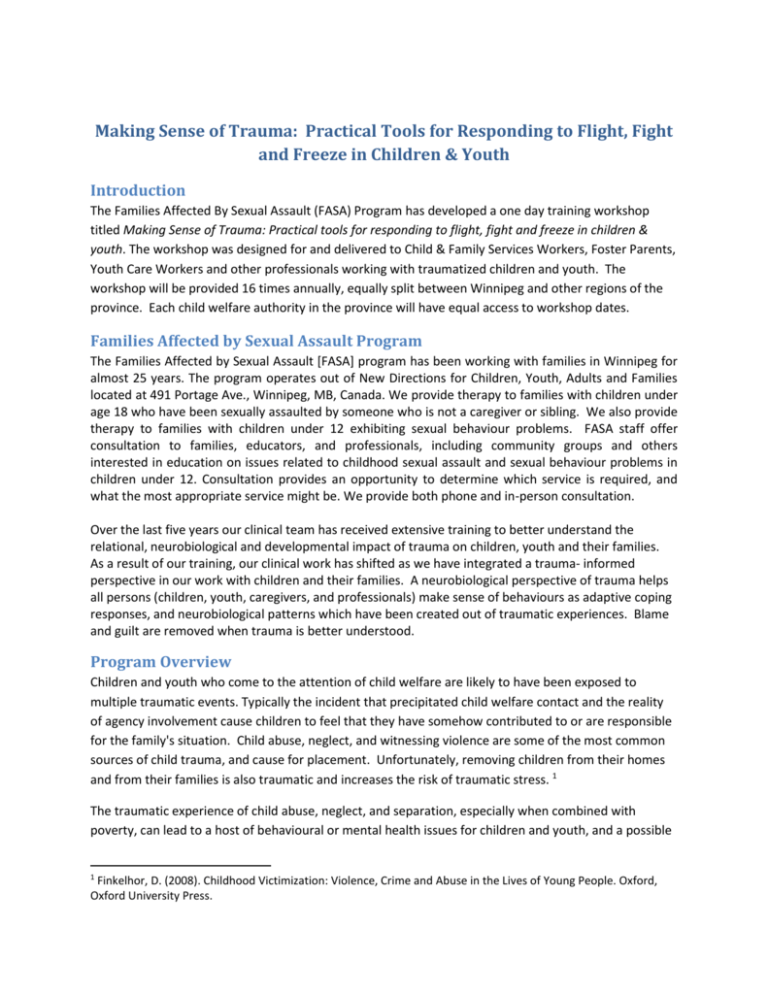
Making Sense of Trauma: Practical Tools for Responding to Flight, Fight
and Freeze in Children & Youth
Introduction
The Families Affected By Sexual Assault (FASA) Program has developed a one day training workshop
titled Making Sense of Trauma: Practical tools for responding to flight, fight and freeze in children &
youth. The workshop was designed for and delivered to Child & Family Services Workers, Foster Parents,
Youth Care Workers and other professionals working with traumatized children and youth. The
workshop will be provided 16 times annually, equally split between Winnipeg and other regions of the
province. Each child welfare authority in the province will have equal access to workshop dates.
Families Affected by Sexual Assault Program
The Families Affected by Sexual Assault [FASA] program has been working with families in Winnipeg for
almost 25 years. The program operates out of New Directions for Children, Youth, Adults and Families
located at 491 Portage Ave., Winnipeg, MB, Canada. We provide therapy to families with children under
age 18 who have been sexually assaulted by someone who is not a caregiver or sibling. We also provide
therapy to families with children under 12 exhibiting sexual behaviour problems. FASA staff offer
consultation to families, educators, and professionals, including community groups and others
interested in education on issues related to childhood sexual assault and sexual behaviour problems in
children under 12. Consultation provides an opportunity to determine which service is required, and
what the most appropriate service might be. We provide both phone and in-person consultation.
Over the last five years our clinical team has received extensive training to better understand the
relational, neurobiological and developmental impact of trauma on children, youth and their families.
As a result of our training, our clinical work has shifted as we have integrated a trauma- informed
perspective in our work with children and their families. A neurobiological perspective of trauma helps
all persons (children, youth, caregivers, and professionals) make sense of behaviours as adaptive coping
responses, and neurobiological patterns which have been created out of traumatic experiences. Blame
and guilt are removed when trauma is better understood.
Program Overview
Children and youth who come to the attention of child welfare are likely to have been exposed to
multiple traumatic events. Typically the incident that precipitated child welfare contact and the reality
of agency involvement cause children to feel that they have somehow contributed to or are responsible
for the family's situation. Child abuse, neglect, and witnessing violence are some of the most common
sources of child trauma, and cause for placement. Unfortunately, removing children from their homes
and from their families is also traumatic and increases the risk of traumatic stress. 1
The traumatic experience of child abuse, neglect, and separation, especially when combined with
poverty, can lead to a host of behavioural or mental health issues for children and youth, and a possible
1
Finkelhor, D. (2008). Childhood Victimization: Violence, Crime and Abuse in the Lives of Young People. Oxford,
Oxford University Press.
increase in psychiatric, social, and behavioural problems. Children, when removed from their homes due
to abuse and neglect and placed in care, have a heightened risk for mental health problems, especially
trauma-induced stress. “Trauma survivors are at risk of being re-traumatized in every social service and
health care setting. This is often due to a lack of knowledge about the effects of traumatic events and a
limited understanding of how to work effectively with those impacted by trauma.” 2
Child welfare providers, foster parents, and mental health workers support children and their families
who have experienced multiple traumas. The one-day trauma-informed training will enable those who
work with children and youth to alter their perceptions of the patterns that they see in families and the
responses of children and youth. Typically service providers respond to the traumatic event or events.
Neurobiology teaches us that we need to respond to the nervous system.
We know from our trauma-informed work as therapists that clients report a decrease in
symptomatology, a greater sense of control over their behavior, and improvements in their
relationships. This trauma-informed training may transform the current way that child welfare or mental
health systems provide services to these children.
Goals and Objectives
This workshop will assist service providers who care and support traumatized children, youth and their
families within child welfare and child and adolescent mental health services to be better able to do
their work in a way that promotes trauma resolution. Additionally the training will address the need of
service providers or caregivers for information and specific techniques to build their sense of efficacy in
their role in trauma resolution.
Workshop Objectives:
To introduce and enhance a primary understanding of the neurobiological impact of trauma on
children and youth;
To teach a framework and language to better explain to children and families the impact of
trauma;
To teach specific methods (tools) to manage dysregulated affect in children;
Develop the knowledge of how a trauma-informed approach to casework practice builds
resilience through case planning and trauma-informed service delivery; and
To teach a way of working with traumatized children and youth that leads to an overall decrease
in symptoms, a greater sense of control over their behavior, and improvements in their
relationships.
2
Klinic. Trauma Informed Toolkit, 2008
2




